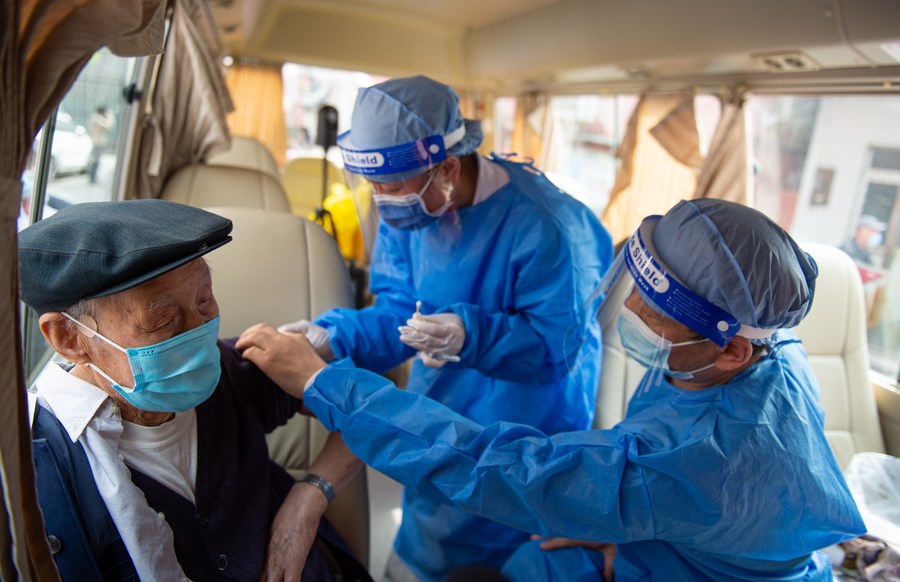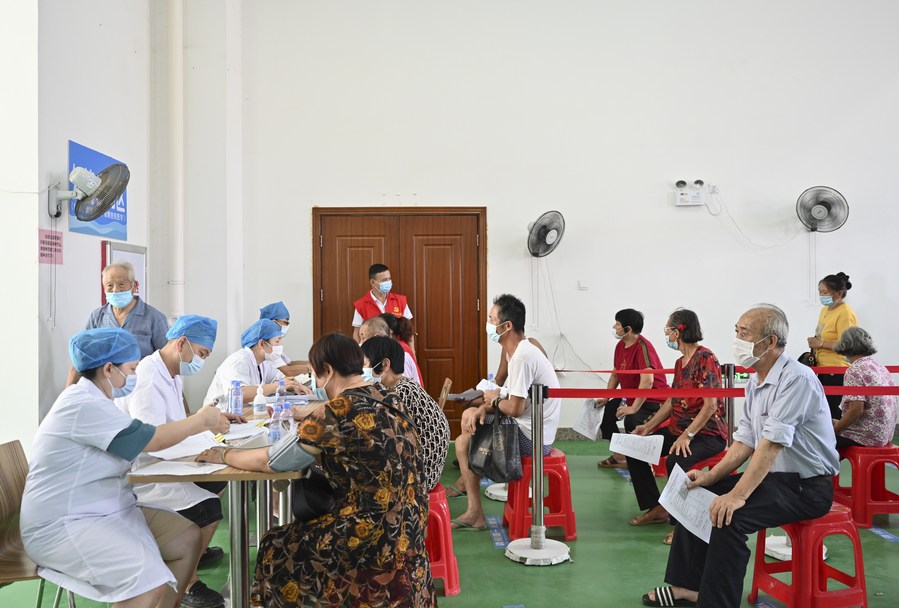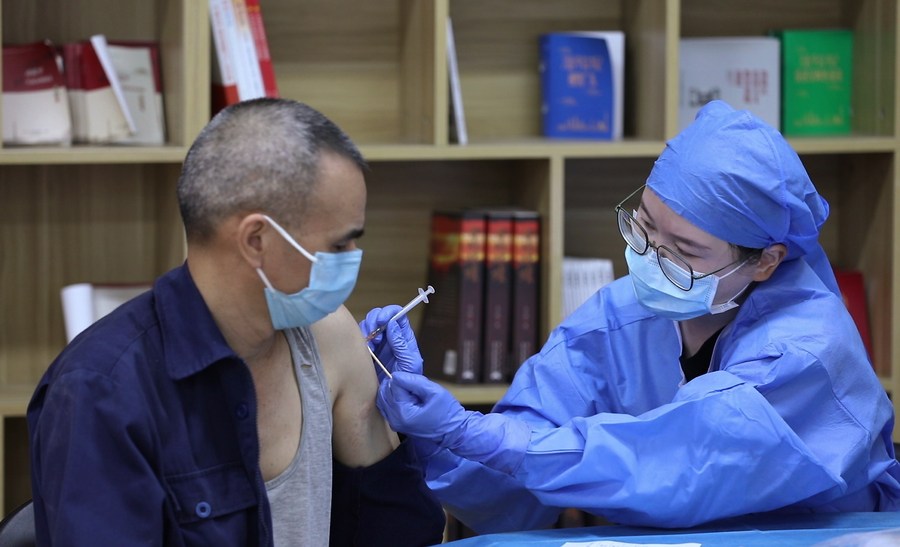
Facing the rampant spread of the Omicron variant and its threats to the health of the elderly, governments at all levels in China are adopting multi-faceted measures to accelerate vaccination among this vulnerable group.
These measures will confront various challenges to reach a high overall vaccination rate and immunization coverage among people aged 60 or above, one of the priorities of China's efforts to combat COVID-19.
They include attempts to dispel the elderly's possible misgivings about vaccination, raise their awareness about its efficacy, and help people with limited mobility get the jab.

A senior citizen receives a dose of COVID-19 vaccine at a mobile COVID-19 vaccination site in Beijing, capital of China, April 9, 2022. (Xinhua/Chen Zhonghao)
FIXING WEAK LINKS
More than 1.24 billion people across the Chinese mainland have been fully vaccinated against COVID-19 as of April 5, accounting for over 90 percent of the population, said the National Health Commission (NHC).
However, the vaccination rate among the elderly is lower than the average rate of other age groups. In south China's Guangdong Province, for instance, it stands just above 70 percent.
The recent COVID-19 resurgence in the Hong Kong Special Administrative Region (HKSAR) highlights the risks the elderly are exposed to when a severe outbreak strikes.
In the fifth wave of the epidemic in the HKSAR, about 95 percent of deaths occurred among people aged 60 or above.
Among the deceased cases, more than 70 percent were unvaccinated. Those who received one, two, or three vaccines account for 15, 11, and 1 percent, respectively, according to data released by the Department of Health of the HKSAR government.
"Though Omicron is less virulent than previous variants, it is still more dangerous than the common flu, especially for older people who have not been fully vaccinated," said Wang Guiqiang, director of the infectious diseases department under the Peking University First Hospital. "COVID-19 data in Hong Kong indicate a close relationship between vaccination and fatality rates."

Senior citizens from local villages line up to have their blood pressure measured before receiving COVID-19 vaccines in Neikeng Town in Jinjiang City, southeast China's Fujian Province, Aug. 31, 2021. (Xinhua/Song Weiwei)
DISPELLING WORRIES
"Some of the elderly, especially those of advanced age, usually worry about the possible adverse reactions of the vaccination, owing to their age, weak conditions, or underlying diseases," said Sun Limei, director of the immunology institute with the Guangdong Provincial Center for Disease Control and Prevention.
Yu Deyou, an 89-year-old who lives alone in the southern Chinese metropolis of Guangzhou, used to think that the risk of infection was low as he seldom went out.
Despite being well-informed about the advantages of vaccination, Yu couldn't help worrying about the possible adverse reactions as he suffered from hypertension, arthritis, and gout.
The community health service center made a medical evaluation for Yu and told him that he was eligible for vaccination. Reassured, Yu took the jabs.
"Receiving the vaccines not only benefits us elderly but also offers assurances to our families," said Yu.
To dispel worries of the elderly like Yu, the provincial health authorities send doctors to their homes to carry out eligibility evaluations and help with appointments. With the assurances from doctors, many older people are getting vaccinated with more confidence.

A senior citizen receives COVID-19 vaccine at a vaccination site in Haizhu district of Guangzhou, south China's Guangdong Province, April 7, 2022. (Xinhua/Wang Ruiping)
IMPROVING VACCINATION RATE
Tang Wanling, 66, has traveled around with her husband since retiring from a state-run factory in Guangzhou. As the epidemic has disrupted her travel plan, she chose to participate in community volunteer work. Tang took the third shot last week.
"As the vaccination site is in the community, we only need to take the elevator or a flight of stairs to get evaluated and vaccinated, which is very convenient for us elderly people," said Tang.
Since late March, the Xingang community of Guangzhou has been carrying out a campaign to accelerate vaccination among the elderly. Within nine days, 1,200 elderly received their first dose of the vaccine.
"We have found that a convenient vaccination site is a key factor for the elderly to get vaccinated. Therefore, we took various measures to provide convenience for them," said Yang Zhihua, a community official in Xingang.
The community provided free physical examinations, transport services, and gifts to encourage the elderly to get vaccinated, said Luo Sui, a Party official in Xingang.
Other innovative methods have been adopted across China to improve the vaccination rate. In Beijing's Haidian district, volunteers aid older people in the whole vaccination process. In Zhejiang Province, vans serving as mobile vaccination sites travel to remote villages to offer jabs to the elderly.
"Some provinces have been innovative in providing vaccination services to the elderly," said Lei Zhenglong, an official with the NHC. "Our ultimate goal is to get all eligible people vaccinated in time."